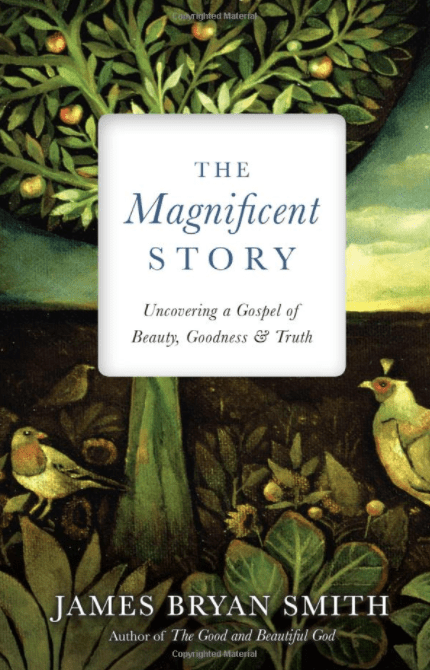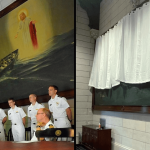 James Bryan Smith, in his new book The Magnificent Story: Uncovering a Gospel of Beauty, Goodness and Truth, says this: “No one ever taught me about the role of beauty in my spiritual life. It was not so much the danger of beauty but its neglect that characterized my life as a Christian. For me, Christianity was about dogma and doctrines, not desire and delight. The shaming story says nothing about creation or beauty. If it plays a role at all, it s in its first statement: “Realize you are a terrible sinner.” Some of our sin is attraction to things we shouldn’t be attracted to (a neighbor’s house or spouse), which might lead us to think that beauty is inherently sinful. In short, we have lost our love for beauty as a means to loving God—or, more accurately, to feeling the love of God.”
James Bryan Smith, in his new book The Magnificent Story: Uncovering a Gospel of Beauty, Goodness and Truth, says this: “No one ever taught me about the role of beauty in my spiritual life. It was not so much the danger of beauty but its neglect that characterized my life as a Christian. For me, Christianity was about dogma and doctrines, not desire and delight. The shaming story says nothing about creation or beauty. If it plays a role at all, it s in its first statement: “Realize you are a terrible sinner.” Some of our sin is attraction to things we shouldn’t be attracted to (a neighbor’s house or spouse), which might lead us to think that beauty is inherently sinful. In short, we have lost our love for beauty as a means to loving God—or, more accurately, to feeling the love of God.”
Beauty. If it isn’t beautiful, it isn’t God, it isn’t Jesus, it isn’t the gospel, it isn’t Christianity. Smith’s right.
When we see beauty as either irrelevant or dangerous, we miss out on one of God’s greatest gifts. God has given us five amazing senses. And each of them is designed to delight in beauty, goodness, and truth. Beauty is meant to lead us to God. Beauty is meant to move us to doxology. Beauty is never the ultimate. It is designed to ^penultimate, to lead us to something beyond itself. If something is beautiful, it is good and true. A right understanding of beauty can enhance our lives on every level. Sensual beauty (a delicious meal, a starry night) and intellectual beauty (a mathematical equation, the idea of the Trinity, the teaching of Jesus) are designed to enhance our lives and deepen our love for God.
We experience beauty but we don’t often think about it. Sometimes — too often for many of us — we don’t have time for beauty. That is, we don’t have time to bask in beauty, to take it in, to embrace it and to wallow in it. We miss life when we don’t. We miss God when we don’t have time for beauty. Great theologians have often reflected on beauty because they’re attentive to divine reality coursing through nature all the time.
Augustine, writing in the fourth century, tells of a time he asked the created world why it exists: I asked the earth, I asked the sea and the deeps, among the living animals, the things that creep. I asked the winds that blow, I asked the heavens, the sun, the moon, the stars and to all things that stand at the doors of my flesh. My question was the gaze I turned to them. Their answer was their beauty.
Perhaps, like Smith, you need to take time to see the beauty.
I was not aware of the role of beauty for much of my Christian life. I was aware of and attracted to beauty, but I did not make the connection between beauty and God in my experience. That has drastically changed. As my friend Rich Mullins once wrote, “There’s so much beauty around us, for just two eyes to see. But everywhere I go … I’m looking.” My Christian life has shifted from my mind to my senses. I am learning to feel the love of God in a sunrise, to taste the love of God in a meal, and to be embraced by the love of God in a gentle breeze.
Until God is beautiful we will not be awed or worship God. The best thing Christianity has is Jesus, not what he said or did but who he was and who he is. What he is is beauty itself.
The Trinity is beautiful. We do not have to do anything to make that so. Everything about Jesus is beautiful. Often I hear people say, “We need to get people to commit to Jesus.” My response is always the same: “We need to get people to know Jesus. “When they come to know Jesus, they will be struck by his beauty. It will sneak past defenses and speak to a generation suspicious of truth claims and unconvinced by moral assertions. Brian Zahnd said it best: “Our task is not to protest the world into a certain moral conformity, but to attract the world to the saving beauty of Christ.”















